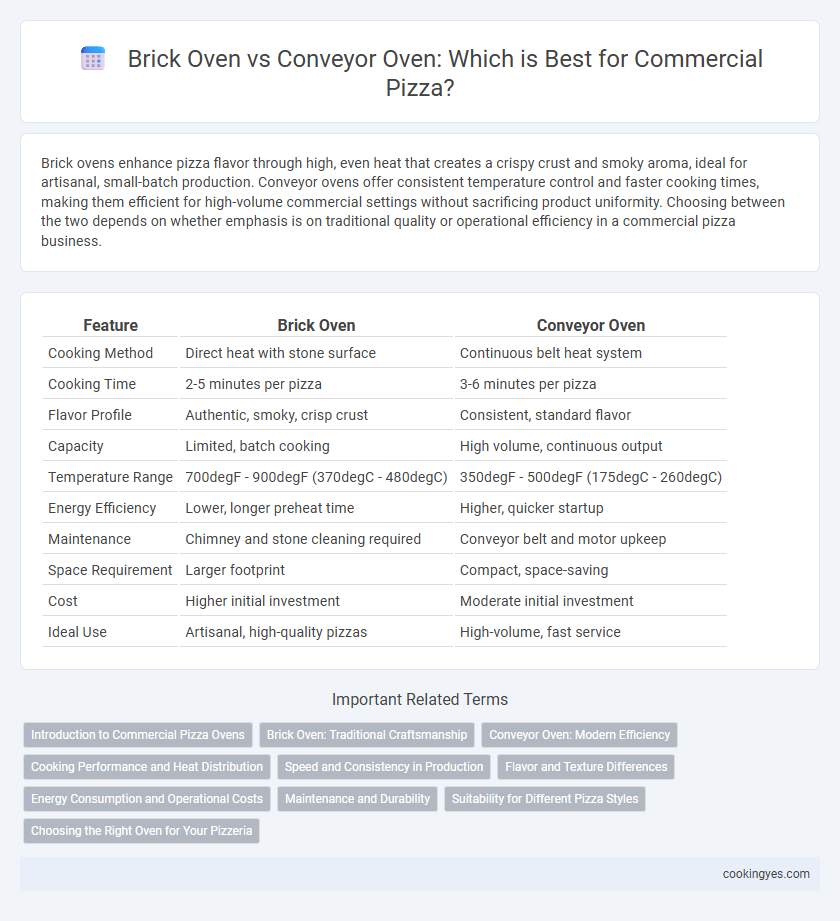Brick ovens enhance pizza flavor through high, even heat that creates a crispy crust and smoky aroma, ideal for artisanal, small-batch production. Conveyor ovens offer consistent temperature control and faster cooking times, making them efficient for high-volume commercial settings without sacrificing product uniformity. Choosing between the two depends on whether emphasis is on traditional quality or operational efficiency in a commercial pizza business.
Table of Comparison
| Feature | Brick Oven | Conveyor Oven |
|---|---|---|
| Cooking Method | Direct heat with stone surface | Continuous belt heat system |
| Cooking Time | 2-5 minutes per pizza | 3-6 minutes per pizza |
| Flavor Profile | Authentic, smoky, crisp crust | Consistent, standard flavor |
| Capacity | Limited, batch cooking | High volume, continuous output |
| Temperature Range | 700degF - 900degF (370degC - 480degC) | 350degF - 500degF (175degC - 260degC) |
| Energy Efficiency | Lower, longer preheat time | Higher, quicker startup |
| Maintenance | Chimney and stone cleaning required | Conveyor belt and motor upkeep |
| Space Requirement | Larger footprint | Compact, space-saving |
| Cost | Higher initial investment | Moderate initial investment |
| Ideal Use | Artisanal, high-quality pizzas | High-volume, fast service |
Introduction to Commercial Pizza Ovens
Commercial pizza ovens vary primarily between brick ovens and conveyor ovens, each offering distinct advantages in heat retention and cooking speed. Brick ovens provide high-temperature, even heat ideal for artisanal pizzas with crispy crusts and smoky flavors, while conveyor ovens ensure consistent cooking times and efficient throughput for high-volume operations. Choosing the right oven depends on factors like menu style, production capacity, and desired pizza texture.
Brick Oven: Traditional Craftsmanship
Brick ovens exemplify traditional craftsmanship, using radiant heat from firebrick walls to evenly cook pizza with a distinctive smoky flavor and crispy crust. Their high thermal mass ensures consistent temperatures, enhancing dough texture and cheese melting. This artisanal approach appeals to customers seeking authentic, wood-fired pizza experiences in commercial settings.
Conveyor Oven: Modern Efficiency
Conveyor ovens provide consistent baking temperatures, ensuring uniform cooking and reducing human error in high-volume commercial pizza production. Their automation allows for faster throughput and precise control over cooking times, which increases efficiency and minimizes energy consumption. Modern conveyor ovens incorporate advanced technology such as digital controls and variable speed belts, optimizing pizza quality while streamlining kitchen operations.
Cooking Performance and Heat Distribution
Brick ovens deliver superior cooking performance by providing intense, radiant heat that evenly cooks pizza with a crisp crust and well-melted toppings. Their heat distribution is consistent due to the thermal mass of the bricks, maintaining steady high temperatures essential for traditional pizza styles like Neapolitan. Conveyor ovens, while offering faster throughput and more control over cooking time and temperature, tend to have less even heat distribution, which can affect the texture and quality of the crust compared to brick ovens.
Speed and Consistency in Production
Brick ovens provide artisanal quality pizzas with high heat that ensures rapid cooking times but may vary in consistency due to manual operation. Conveyor ovens deliver uniform cooking by automating temperature control and cooking speed, enabling high throughput and consistent product quality in commercial settings. Speed-wise, conveyor ovens excel in handling large volumes efficiently, while brick ovens prioritize flavor and traditional texture.
Flavor and Texture Differences
Brick ovens impart a distinctive smoky flavor and create a crisp, charred crust due to their intense, even heat, ideal for traditional Neapolitan-style pizzas. Conveyor ovens provide consistent cooking with a more uniform texture, often producing softer crusts better suited for high-volume commercial environments. The choice between brick and conveyor ovens significantly influences the pizza's flavor profile and crust texture, affecting customer satisfaction and brand identity.
Energy Consumption and Operational Costs
Brick ovens typically consume more energy due to longer preheating times and higher temperatures required to maintain consistent heat, increasing operational costs in commercial pizza production. Conveyor ovens offer greater energy efficiency with preset temperature controls and continuous cooking, leading to reduced energy consumption and lower utility bills. Businesses must weigh the higher initial installation cost of brick ovens against the conveyor oven's ongoing savings in energy and maintenance expenses.
Maintenance and Durability
Brick ovens offer superior durability with heavy-duty refractory materials that withstand high temperatures and frequent use, requiring minimal maintenance focused on cleaning ash and inspecting the brickwork. Conveyor ovens feature complex mechanical parts such as belts and motors that demand regular maintenance to prevent wear and ensure consistent cooking performance, potentially increasing downtime. The longevity of brick ovens generally surpasses conveyor ovens due to their robust construction, making them a reliable choice for high-volume pizzerias prioritizing reduced maintenance costs.
Suitability for Different Pizza Styles
Brick ovens excel in producing Neapolitan and artisanal pizzas due to their high, consistent heat and unique smoky flavor, which enhances crust texture and toppings. Conveyor ovens offer precise temperature control and fast, uniform cooking, making them ideal for New York-style and thin-crust pizzas in high-volume commercial settings. Each oven type suits different pizza production needs, with brick ovens favoring traditional styles and conveyor ovens supporting efficiency and consistency.
Choosing the Right Oven for Your Pizzeria
Selecting the right oven for your pizzeria depends on production volume and desired pizza quality. Brick ovens offer authentic wood-fired flavors and high heat retention, ideal for artisanal pizzas with crispy crusts. Conveyor ovens provide consistent cooking, faster throughput, and energy efficiency, making them suitable for high-demand environments prioritizing speed and uniformity.
Brick oven vs Conveyor oven for commercial pizza Infographic

 cookingyes.com
cookingyes.com